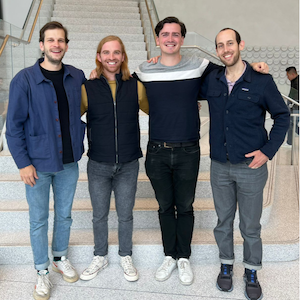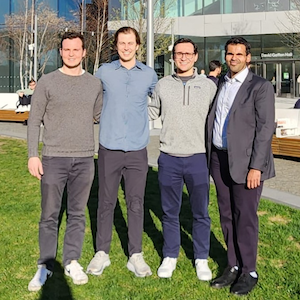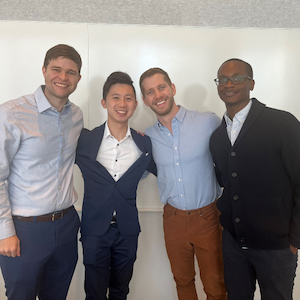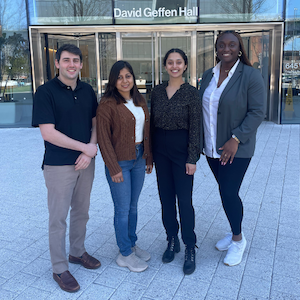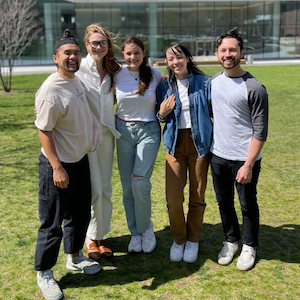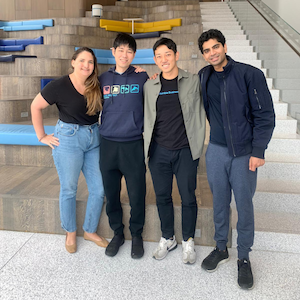Africa50Africa50 is an investment platform backed by the Africa Development Bank and African government that invests in high-impact medium to large scale infrastructure projects across Africa. To further enable preliminary investment committee decisions from an ESG perspective, Nneoma Nwankwo ’23 developed a dynamic Environmental, Social, and Governance (ESG) risk mapping scorecard for potential investments across all the sectors that Africa50 invests in. By leveraging research and iterating with the in-house ESG team, 23 risk factors were developed; risks were then weighed on a scale from 0 (minimal risk) to 3 (high risk) for 59 infrastructure sub-sectors. This scorecard has been seamlessly integrated into Africa50’s pre-existing ESG screening tool ensuring that the screening process remains frictionless for the end-user, while providing enhanced ESG assessments of strategic infrastructure investments across Africa.
|
BFA GlobalBFA Global is an impact innovation firm that works in underserved regions across topics as diverse as digital commerce and climate resilience. BFA Global meets its goals through a mixture of research and advisory services, digital solution development, and venture capital. Triggering Exponential Climate Action (TECA), a program run by BFA Global, aims to launch 100 startups working at the intersection of fintech and climate resilience for vulnerable communities. TECA provides seed funding and early-stage venture building support to the selected startups. Shreyas Garg ’24, Caroline Kopf ’24, and Julien Souffrant ’24 provided strategic portfolio support to TECA’s first-ever cohort of seven startups building the Blue Economy in East Africa. The fellows primarily focused on two areas — (1) providing feedback and preparing the startups for ongoing pitch events and future fundraising efforts; and (2) supporting TECA’s venture building efforts by exploring potential business models and consulting with the startups on their ongoing operations.
|
BlackRockWithin BlackRock’s equities division sits the impact investing team, which is driving sustainable investing across the firm. The BlackRock Impact Funds seek to maximize long-term total returns through active investment in publicly-listed companies whose core business products or services are addressing the world’s greatest social and environmental problems that span across different impact themes in alignment with the UN Sustainable Development Goals. The impact themes include a wide array of categories including but not limited to, affordable housing, education, financial and digital inclusion, public health, safety and security, electrification and digitalization, green energy, pollution remediation and prevention, sustainable food, water and waste management. Amanda Vidal Beare ’24, Sebastian Hochbaum ’24, Maite Passarelli ’24, and Guillermo Canales Urquiola ’24 conducted research and analysis to provide investment recommendations for 100+ companies across the green energy; efficiency, electrification and digitalization; and pollution remediation and prevention impact themes. These recommendations will aid BlackRock in making investment decisions across its portfolio.
|
BridgeTekThe clean energy revolution has begun. Electric vehicles are going mainstream and yet battery supply is a critical vulnerability to meeting market demand. Energy storage is critical to enable variable renewables (solar and wind) to continue to grow and become more central to our electricity supply. BridgeTek is a US company that operates a Korean R&D and manufacturing facility but currently has no presence in the US. Silvia Gelonch ’23, Richard Leahy ’23, Rebecca Loh ’23, and Danny Wagemans ’23 worked with BridgeTek to develop a market strategy for entering the US ESS market. In order to define BridgeTek's market entry strategy the project identified key market opportunities, mapped the landscape of competitors, identified key customer segments, and analyzed segment sales cycles. The team then defined a strategy identifying where to play and how to win for BridgeTek.
|
Closed Loop PartnersClosed Loop Partners (CLP) is an investment firm active across the capital structure, including venture capital, growth equity, and credit. CLP’s Venture Group provides pre-seed and seed investment to companies in the circular economy across a range of climate tech verticals. Of particular interest in the climate tech space is how to creatively use industrial waste as feedstocks to other processes. The Carbon-to-Value (C2V) space is an emerging market area of companies that are directly using CO2 as a feedstock to industrial processes to produce value-added products. These products can range from industrial intermediaries such as chemicals and materials to finished goods ready for sale in retail or direct-to-consumer channels. C2V is at core of the circular economy philosophy, and Closed Loop was interested in developing a better understanding of the space. Max De Boer ’23, Mark Kovacs ’23, Andrew Litzler ’23, and Moses Wajsman ’23 built out a landscape of 65+ companies active in the C2V space, as well as an approach for rapidly selecting only those companies that were likely to meet Closed Loop’s investment criteria, identifying eight promising startups for consideration. The team also performed due diligence on two of these potential targets for Closed Loop.
|
Energize VenturesEnergize Ventures is a leading software investor accelerating digital innovation in climate and sustainability. The firm has $1.2B+ in assets under management within venture and growth funds across more than 20 active investments in the US and Europe. Nicola Benatti ’23, Daniel Ioselevich ’24, Pranav Shanbhag ’23, and Mike Shuster ’24 developed the firm’s investment thesis for researching and entering the home and building electrification sector. The fellows conducted research that incorporated market sizing by region and customer type, market mapping across the heat pump value chain from installation to operational monitoring, and an evaluation of thematic tailwinds and headwinds within the sector. Using this research, the fellows identified critical barriers within the heat pump value chain that are inhibiting fast large-scale adoption. Finally, the fellows sourced companies tackling these barriers that meet Energize Venture’s investment mandate.
|
NewlabNewlab launches challenges to drive project-level work and facilitate market pull across its applied innovation business. Challenges are systematically identified based on insights from Newlab’s member community, primary/secondary research, and unique access to market signals generated through collaboration with industry and government partners. Each challenge definition sprint should result in a portfolio of projects that can accelerate the rate of technology commercialization to address decarbonization at scale. Max Haraldsen ’24, Ugo Nwadiani ’24, Patrick Lin ’24, and Chris Scanzoni ’24 supported Newlab in defining challenges to decarbonize US energy systems, with a deep-dive on grid-scale energy storage in offshore wind use cases specifically. Deliverables also included a system-wide mapping of all energy sector emissions (power, transport, industry, and buildings) to fifty identified pathways/solutions, and an interactive model assessing all identified solutions across a set of criteria including decarbonization potential, technology readiness level (TRL), economics, demand signal, ecosystem signal, and Newlab model fit.
|
Safi OrganicsMost fertilizers today are produced in large-scale, centralized facilities and then imported to rural areas. Due to the logistical mark-up, rural farmers in emerging economies such as Africa and India often pay much more than the rest of the world for their fertilizers. This adds to the cost of food production for small-scale farmers, driving them into a vicious cycle of poverty. Safi Organics uses technology to downsize and decentralize fertilizer production thereby reducing the logistical cost and producing a high-quality product that can improve farmers’ yields by up to 30 percent. To grow to 20,000 customers within the next 12 months, Safi needs to implement a more automated system to track/visualize sales and inventory levels of the different products in real time. Aparna Bagade ’23, Ijeoma Ejimadu ’24, Andrew Fradin ’24, and Raveena Goyal ’23 mapped out the current process of sales and inventory management and brainstormed ways to streamline the process, culminating in sandboxing two promising systems for sales and production teams. Finally, the team designed a new process to manage sales and inventory data.
|
SJF VenturesSJF Ventures is an impact-focused venture capital firm that invests in high-growth companies with business models aimed at mitigating climate change, advancing economic opportunities, and improving health and wellness. First founded in 1999, SJF is an established impact firm with a 23-year history and over 80 expansion-stage investments across five funds. The team worked with SJF Ventures to assist in carbon management and accounting for the fund’s portfolio companies. Tom Cerenov ’24, Gemma Corsi ’24, Jules Healey ’24, Ray Lu ’24, and Laura Correa Ocampo ’24 helped SJF catalog its overall carbon footprint through Persefoni, gaining direct knowledge of the nuances in the early field of carbon reporting. In addition, the team helped the fund draft a “Carbon Management 101” primer for its portfolio companies and to share with its broader audience. The partnership helped to highlight some of the challenges in impact reporting and find ways to support SJF’s thought leadership in the space.
|
Wireframe VenturesWireframe Ventures backs mission-driven founders using advanced technology or unique market insight to dramatically improve the health of people and planet. They invest across climate tech and sustainability, digital health, tech-bio, transportation, retail, agriculture, and more. Krishna Bagadia ’24, Hoshi Ogawa ’24, Jessie Swanseen ’23, and Sho Tatsuno ’24 helped Wireframe Ventures identify the impact of recent scientific and technological advancements on the carbon removal industry. The project aimed to determine which CO2 removal methodologies had the potential for scalability and cost-effectiveness and were most likely to succeed in the industry over the next decade. To achieve this, project members created a framework by categorizing different CO2 removal approaches. Then, they analyzed these methodologies based on their costs/benefits to identify the industry's current challenges and developed a framework for comparison. Finally, they conducted a market analysis of the industry, looking at present and future market scenarios to identify potential winners and losers.
|




